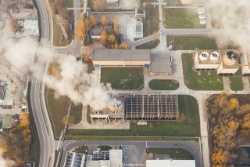Cyclone Recovery Reliant On Urgent Targeted Intervention, Roundtable Told
A successful economic recovery for Hawke’s Bay’s cyclone-hit horticulture sector will rely on receiving urgent targeted intervention, a roundtable - including growers, wider industry representatives, the financial services sector, local government, subject matter experts, and representatives from both government and opposition - heard this morning.
The session, chaired by Horticulture New Zealand Chair Barry O’Neill, launched Hawke’s Bay Horticultural Sector: Economic recovery following Cyclone Gabrielle - the result of a six-week in-depth study into the impact of Cyclone Gabrielle led by Boston Consulting Group’s New Zealand team.
Lead author and BCG New Zealand managing partner Phillip Benedetti says the session gave the opportunity for all of the different players who are active stakeholders in the region’s recovery to have the time to question, clarify and discuss the multi-pronged solution to a very complex problem.
The report estimates the bill for assistance for the sector in Hawke’s Bay will sit between $650 and $960 million.
Mr Benedetti says that, along with urgent commitment for financial intervention, the other crucial factor is getting the structure of the response right.
“The report proposes a suite of response activity, some require government funding, but all require active participation by government and key players such as growers, banks, insurers, local government and others.”
“There is a risk that the proposed actions are seen as an a la carte menu where we can pick and choose responses and hope that does enough to get us over the line. However, our analysis shows that not taking a holistic approach is that this would still put the region in danger of setting back recovery. ”
“In the absence of interventions, the sector is not expected to fully rebuild. As a base case, it will suffer from $3.5 billion in cumulative losses to 2030 as land is not replanted or is put to lower value uses (e.g., cropping or sheep farming) with lower capital outlay, and investment into the sector reduces. Losses may be higher if the sector recovery rate is below base case assumptions,” he said.
Rockit Global Chair John Loughlin, who was at the session, says that the report is a very useful tool for industry in its ongoing discussions with government.
“We need an investment approach, rather than a sprinkle of funding in response to industry lobbying at intermittent intervals as that hampers the sector’s ability to plan and move at pace.”
“I want to emphasise that the solution proposed by BCG should be seen by government as an investment, rather than a cost. A successful outcome is a major prize for Hawke’s Bay and New Zealand.”
The region makes up around 15% of New Zealand’s total horticulture output, accounts for around $1.2 billion and in economic value and supports around 7000 permanent jobs.
Mr Loughlin goes on to say that the feedback from the session reflected the importance of time.
“Our industry relies on the seasons. Time is a variable that we do not have control over. We are led by the seasons, and that gives us a finite window of time before we get to planting season for many.”
Mr O’Neill adds that the feedback from the session this morning is that government needs to move without delay.
“It feels like a standoff between government and the financial services sector to see who will move first. We need government to move first and take a lead role in breaking the delay. Banks need government to enable the path forward so they can do their business.”
The report and slide deck are attached.


 Commerce Commission: ComCom Warns Of Pyramid Schemes After South Auckland Scammers Plead Guilty
Commerce Commission: ComCom Warns Of Pyramid Schemes After South Auckland Scammers Plead Guilty MBIE: MBIE Publish Mid-Point Review Of The Phase-Out Of The Low Fixed Charge (LFC)
MBIE: MBIE Publish Mid-Point Review Of The Phase-Out Of The Low Fixed Charge (LFC) Science Media Centre: Company Claims To Have “De-Extincted” The Dire Wolf – Expert Reaction
Science Media Centre: Company Claims To Have “De-Extincted” The Dire Wolf – Expert Reaction Stats NZ: Greenhouse Gas Emissions Fall 2.0 Percent In The December 2024 Quarter
Stats NZ: Greenhouse Gas Emissions Fall 2.0 Percent In The December 2024 Quarter The Reserve Bank of New Zealand: Christian Hawkesby Appointed As Governor Of The RBNZ
The Reserve Bank of New Zealand: Christian Hawkesby Appointed As Governor Of The RBNZ Kiwi Economics: It’s Mayhem In Markets As Downside Risks Dominate Following Trump’s Tariffs
Kiwi Economics: It’s Mayhem In Markets As Downside Risks Dominate Following Trump’s Tariffs



